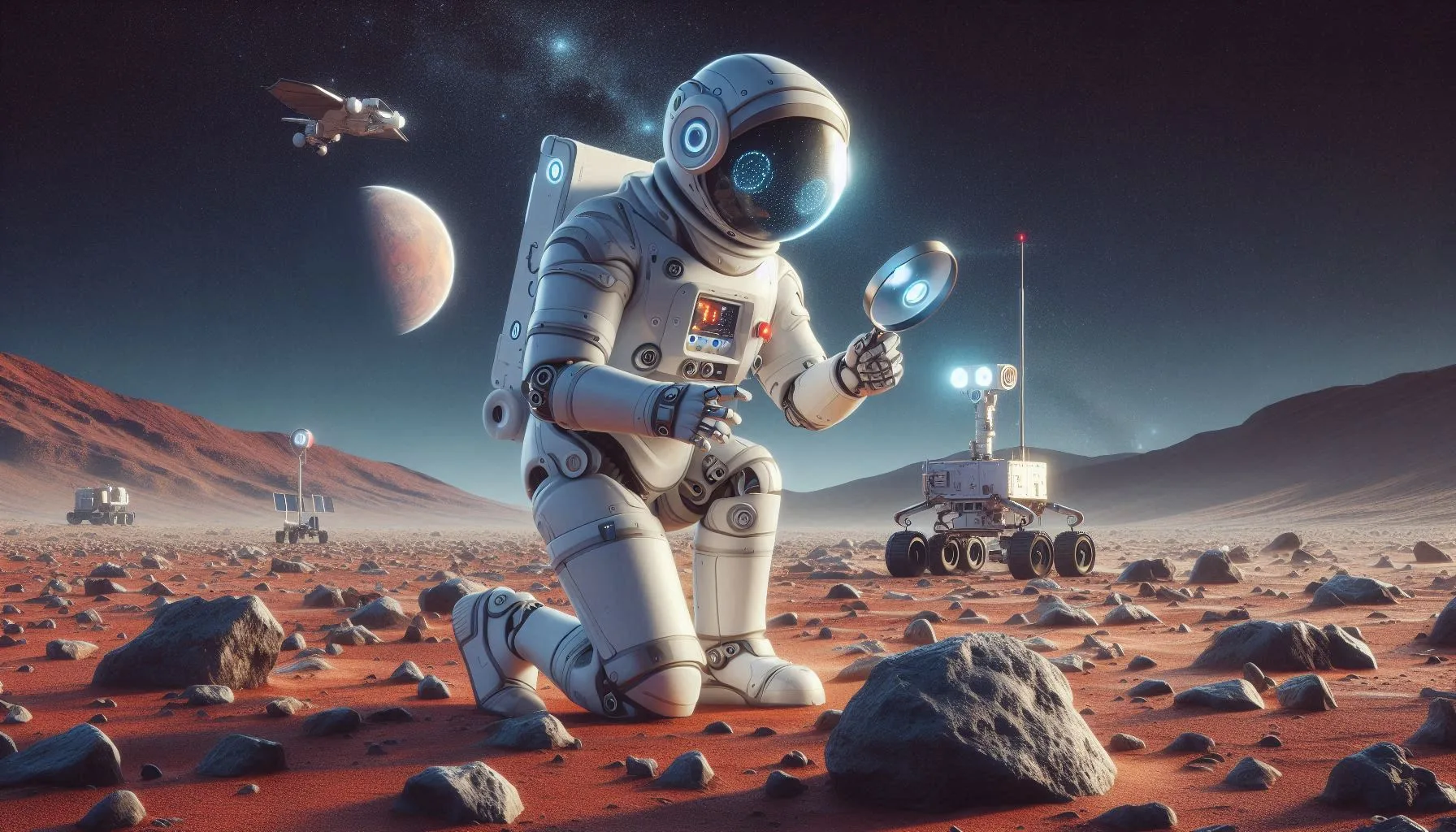In recent decades, Artificial Intelligence (AI) has become a pivotal technology, revolutionizing various industries, including space exploration. The integration of AI in space missions has opened new horizons, enhancing our ability to explore, understand, and interact with the cosmos. From autonomous spacecraft and robotic assistants to data analysis and predictive maintenance, AI plays a crucial role in both current missions and future endeavors.
Historical Context and Current Applications
1. AI and Robotics: The Journey Began
The journey of AI in space exploration began with the development of robotic systems. Robotic spacecraft like the Mars rovers are equipped with AI-driven systems that enable autonomous navigation and decision-making. For instance, NASA’s Curiosity rover, which landed on Mars in 2012, uses AI to navigate the Martian terrain. The rover’s onboard software processes images from its cameras, identifies obstacles, and plans safe paths. This autonomy allows the rover to cover more ground and conduct experiments without direct intervention from Earth-based mission control.
2. Data Analysis and Interpretation
AI has transformed the way scientists analyze and interpret data collected from space missions. Space telescopes and satellites generate massive amounts of data, far beyond the capacity of human analysts. AI algorithms can sift through this data, identifying patterns and anomalies that might indicate new discoveries. For example, the Kepler Space Telescope, responsible for discovering thousands of exoplanets, utilized AI to analyze light curves and detect potential planets. This approach significantly accelerated the discovery process, revealing planets that might have otherwise gone unnoticed.
3. Predictive Maintenance and Mission Support
AI-powered predictive maintenance is crucial for the longevity and success of space missions. Spacecraft and satellites are subjected to harsh conditions, and maintaining their functionality is essential. AI systems monitor the health of these machines, analyzing sensor data to predict potential failures and recommend maintenance actions. This proactive approach minimizes downtime and extends the operational lifespan of critical space assets.
4. Human-Robot Collaboration
One of the most exciting aspects of AI in space exploration is the collaboration between humans and robots. AI-driven robotic assistants can perform tasks that are too dangerous or complex for astronauts. For instance, the European Space Agency’s CIMON (Crew Interactive Mobile Companion) is an AI-powered assistant designed to support astronauts on the International Space Station (ISS). CIMON can interact with crew members, answer questions, and assist with experiments, enhancing productivity and safety in space.
The Future of AI in Space Exploration
As we look to the future, the role of AI in space exploration will become even more significant. Emerging technologies and advancements in AI promise to revolutionize the way we explore and understand the universe.
1. Autonomous Spacecraft and Rovers
The next generation of space missions will feature highly autonomous spacecraft and rovers capable of complex decision-making and problem-solving. These AI-driven explorers will operate with minimal human intervention, enabling missions to distant and challenging environments. For example, NASA’s Perseverance rover, launched in 2020, is equipped with AI technologies that enhance its ability to navigate and conduct experiments on Mars. Future missions to moons like Europa and Titan will rely on similar autonomous systems to explore these intriguing worlds.
2. AI in Deep Space Missions
Deep space missions present unique challenges, including vast distances and communication delays. AI will play a crucial role in overcoming these obstacles. Autonomous spacecraft will need to make real-time decisions without waiting for instructions from Earth. AI algorithms will process sensor data, identify hazards, and adapt to changing conditions, ensuring the success of missions to the outer reaches of our solar system and beyond.
3. Advanced Data Analysis and Discoveries
The amount of data generated by space missions will continue to grow exponentially, necessitating advanced AI-driven analysis tools. Machine learning and neural networks will enable scientists to extract valuable insights from complex datasets. AI will assist in the discovery of new celestial objects, the characterization of exoplanets, and the study of cosmic phenomena. These discoveries will expand our understanding of the universe and fuel future explorations.
4. AI in Human Spaceflight
As human spaceflight ventures beyond low Earth orbit, AI will play a vital role in ensuring the safety and success of missions. AI-powered systems will assist astronauts with mission planning, resource management, and emergency response. In the context of long-duration missions to Mars or other destinations, AI will provide psychological support and companionship, helping astronauts cope with isolation and stress.
5. AI and Space Colonization
The concept of space colonization, once confined to science fiction, is becoming a tangible goal. AI will be instrumental in establishing and sustaining human colonies on other planets. From habitat construction and resource extraction to life support systems and environmental monitoring, AI-driven technologies will enable self-sufficient and sustainable colonies. These colonies will serve as stepping stones for further exploration and the eventual settlement of the solar system.
Ethical Considerations and Challenges
While the integration of AI in space exploration offers immense benefits, it also raises ethical considerations and challenges that must be addressed.
1. Autonomy and Accountability
The autonomy of AI systems in space missions raises questions about accountability and decision-making. When AI-driven spacecraft or robots make critical decisions, it is essential to establish clear protocols for accountability. Ensuring that human oversight remains in place, even in highly autonomous missions, is crucial to maintaining control and addressing ethical concerns.
2. Data Privacy and Security
The data collected by space missions is valuable for scientific research and commercial applications. Protecting this data from cyber threats and ensuring privacy is a priority. AI systems must be designed with robust security measures to safeguard against potential breaches and misuse of information.
3. Bias and Fairness
AI algorithms are only as unbiased as the data they are trained on. Ensuring fairness and eliminating bias in AI-driven space exploration is essential to avoid skewed results and misinterpretations. Continuous monitoring and refinement of AI systems are necessary to address these issues and maintain the integrity of scientific discoveries.
Conclusion
The role of AI in space exploration is both transformative and promising. From enhancing the capabilities of robotic explorers and optimizing data analysis to ensuring the safety of human spaceflight and enabling future colonization efforts, AI is at the forefront of our quest to explore the cosmos. As we continue to push the boundaries of space exploration, ethical considerations and challenges must be addressed to ensure the responsible and beneficial use of AI. With advancements in AI technology, the future of space exploration holds limitless possibilities, paving the way for new discoveries and the expansion of humanity’s presence in the universe.




